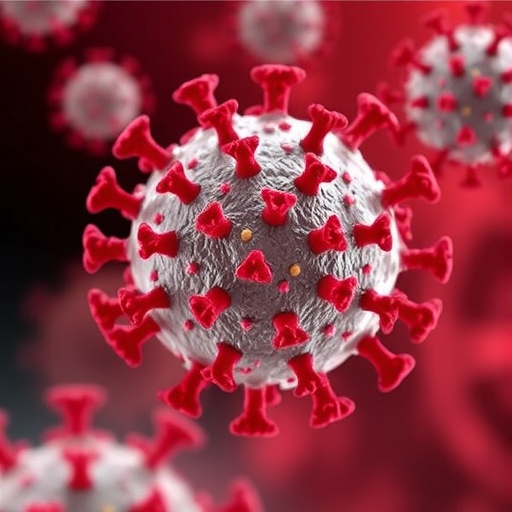In a groundbreaking development in the fight against COVID-19, researchers have unveiled an innovative intranasal vaccine that combines the potent properties of an adenovirus vector and a trimeric subunit protein. This novel approach offers a promising avenue for heightened immunity specifically targeting the Omicron variant of SARS-CoV-2, which has presented unique challenges to existing vaccination strategies. The research, orchestrated by a team led by eminent scientists, illustrates both a technical triumph and a significant advance in the realm of vaccinology.
The foundation of this study lies in the ongoing struggle against SARS-CoV-2 and its variants, particularly the Omicron strain, renowned for its increased transmissibility and ability to partially evade immunity derived from previous infections and vaccinations. Previous studies demonstrated that intranasal vaccines could stimulate robust mucosal immunity, which plays a crucial role in preventing viral entry and establishing respiratory infections. Utilizing a combination of adenoviral vectors and trimeric proteins enhances this immune response, potentially leading to improved outcomes in public health.
The adenoviral vector serves as a delivery system, transporting the genetic instructions for the spike protein of the SARS-CoV-2 virus into human cells. This process triggers an immune response, allowing the body to produce antibodies and train T-cells against the virus. Coupled with trimeric subunit proteins—which stabilize the spike protein’s conformation—the vaccine effectively presents the immune system with a reliable target, leading to a more comprehensive defensive response. This dual-action strategy promises to enhance both systemic and mucosal immunity, an area of particular concern when addressing respiratory viruses.
The study meticulously details the methodology behind the vaccine formulation, which involved rigorous preclinical testing in animal models. These trials were designed to assess both the safety and immunogenicity of the vaccine candidate. Researchers observed that the combination of the adenoviral vector and the trimeric protein led to robust antibody responses, surpassing those generated by traditional vaccine modalities. Furthermore, the preclinical data indicated an increase in the production of neutralizing antibodies specifically targeting the Omicron variant, suggesting a tailored approach to contemporary viral threats.
The implications of this research are profound. As new variants of concern continue to emerge, the need for vaccines that can adapt and provide effective immunity becomes more pressing. Conventional vaccines, while beneficial, have shown varying degrees of effectiveness against these variants. The intranasal adenovirus-trimeric subunit vaccine aims to close this gap by eliciting a broad and potent immune response, thereby fortifying the population against potential outbreaks of Omicron and similar variants.
One of the key advantages of the intranasal delivery route is its ability to induce local immunity in the respiratory tract. This is particularly essential for viruses like SARS-CoV-2, which primarily enter the body via the nose and throat. By administering the vaccine intranasally, researchers aim to enhance the levels of secretory IgA, the primary antibody found in mucosal areas, which can neutralize pathogens before they establish infection. This could dramatically reduce transmission rates and lead to lower infection incidences across communities.
Alongside these scientific advancements, the study also addresses potential avenues for widespread vaccine administration. Intranasal vaccines are generally easier to distribute and require less stringent storage conditions compared to their injectable counterparts, making them feasible for mass vaccination campaigns, particularly in resource-limited settings. As global vaccination efforts continue to grapple with logistics and accessibility, this characteristic could prove invaluable in enhancing coverage and compliance.
The researchers emphasize the importance of continued vigilance in monitoring the evolution of the virus, especially as mutations may lead to new challenges in vaccine efficacy. This intranasal vaccine represents not just a response to the current state of the pandemic but also a proactive measure against future variants. By establishing a strong foundational immunity, the hope is to limit the emergence of new strains capable of undermining the public health framework.
As with all new vaccine candidates, careful evaluation through clinical trials will be essential to ascertain long-term safety and effectiveness in human subjects. The preclinical results are promising, yet they must translate into successful outcomes in clinical settings. Researchers are optimistic about the potential impact of this vaccine on future vaccination strategies, especially as we strive to move toward a post-COVID-19 world.
Importantly, this research underscores the collaborative nature of scientific progress, showcasing contributions from various disciplines ranging from immunology to genetic engineering. The synthesis of knowledge and technology has paved the way for this innovative approach to vaccination. It is a testament to the collective efforts of the global scientific community in combating one of the most significant health crises in recent history.
In conclusion, the intranasal vaccine combining adenovirus and trimeric subunit protein exemplifies a significant leap forward in the battle against SARS-CoV-2, specifically its Omicron variant. Through innovative approaches and a focus on enhancing immunity, researchers aim to provide a viable solution to a pressing public health challenge. As we eagerly await further developments, this research remains a hopeful beacon, illuminating pathways towards more resilient and adaptive vaccination strategies to protect our global community.
Subject of Research: Vaccine development against SARS-CoV-2 Omicron variant
Article Title: Intranasal vaccine combining adenovirus and trimeric subunit protein provides superior immunity against SARS-CoV-2 Omicron variant.
Article References:
Hong, W., Cheng, P., Yang, J. et al. Intranasal vaccine combining adenovirus and trimeric subunit protein provides superior immunity against SARS-CoV-2 Omicron variant.
Nat. Biomed. Eng (2025). https://doi.org/10.1038/s41551-025-01517-2
Image Credits: AI Generated
DOI: https://doi.org/10.1038/s41551-025-01517-2
Keywords: Intranasal vaccine, adenovirus vector, trimeric protein, SARS-CoV-2, Omicron variant, mucosal immunity, vaccination strategy, immune response.
Tags: adenovirus vector vaccinebreakthroughs in vaccinologychallenges of Omicron strainenhanced immune response against COVIDimmune system training against virusesintranasal COVID-19 vaccinemucosal immunity in respiratory infectionsnew vaccine developments 2023Omicron variant immunitypublic health vaccine innovationsSARS-CoV-2 vaccination strategiestrimeric subunit protein





